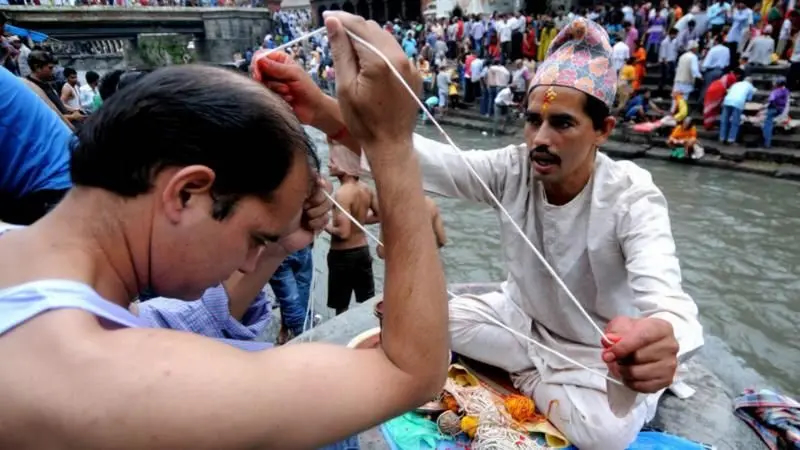Chinese Influence Puts the Existence of Janai Purnima and Raksha Bandhan at Risk!

In recent years, Nepal's religious festivals have been increasingly influenced by external factors, raising concerns about the negative impact of Chinese products on the country's traditions and religious practices. The sacred festivals of Janai Purnima and Raksha Bandhan, in particular, are facing new challenges due to the production and consumption of these materials, which are now predominantly sourced from China.
The Perspective of Maheshraj Pant: Protecting Our Cultural Heritage
Maheshraj Pant, a respected cultural and religious scholar, has emphasized the importance of preserving Nepal's sacred traditions. Speaking on the significance of Janai Purnima, he stated, "Janai Purnima is a deeply rooted religious and cultural festival, where the tradition of wearing the sacred thread (Janai) and tying the protective thread (Raksha) is integral to our ancient customs. While external influences are impacting our traditions in various ways, it is crucial that we protect our heritage. We must respect other cultures while ensuring the preservation of our own."
Pant further highlighted that while there is value in learning from external influences, it is essential that they do not endanger the integrity of Nepal's unique traditions and rituals. His message is clear: it is the responsibility of every Nepali to safeguard their cultural heritage, even in the face of globalization.
The Impact of Chinese Products
One of the most concerning aspects of this issue is the widespread use of Chinese-made materials during Janai Purnima and Raksha Bandhan. Items such as the sacred thread (Janai), Raksha threads, and various ritual items are now mostly imported from China. Although these products are available at a lower cost, they are often produced without adhering to the religious rituals and methods required to maintain their sanctity.
Traditionally, the making of the Janai involves a meticulous process where pure raw cotton is used, and the thread is prepared under the recitation of sacred mantras. This process is not just about the physical creation of the thread but also about infusing it with spiritual significance. However, Chinese-manufactured Janai threads are mass-produced without following these rituals, leading to a loss of the spiritual purity that is essential to the festival.
Similarly, the Raksha threads used during Raksha Bandhan, often produced in China, lack the religious observances necessary for their sanctity. This commercial approach to religious items is undermining the spiritual significance of these festivals, and the same can be said for other ritual items used in worship. When these items are not made following the traditional methods, they risk eroding the deep religious faith that underpins these festivals.
The Sanctity of Religious Beliefs and the Purity of Production
Religious faith is a profound part of Nepalese culture, deeply intertwined with the nation's identity, beliefs, and practices. When materials used in religious observances are produced without respect for the traditional methods, it can weaken the foundation of these beliefs. Items such as the Janai, Raksha threads, and ritual materials carry a spiritual and religious importance that must be honored. The production of these items in China, often without any adherence to the necessary religious rituals, threatens to diminish their spiritual value.
The Commercialization of Religious Items
The commercialization of religious items is a growing concern in Nepal. These items, which should be produced with spiritual integrity, are increasingly being treated as mere commodities. The mass production of these materials in China is contributing to the erosion of Nepal's religious traditions and cultural practices. Janai Purnima, for example, is a festival that demands the highest standards of purity, sanctity, and spirituality in the items used. However, the easy availability and low cost of Chinese products are leading many to choose convenience over tradition, weakening the very fabric of Nepalese cultural heritage.
Conclusion
Janai Purnima and Raksha Bandhan are integral parts of Nepal's religious and cultural identity. To preserve these traditions, it is essential to ensure that the materials used in these festivals retain their religious purity and significance. As Maheshraj Pant aptly pointed out, "While it is important to learn from external influences, we must always remain vigilant in protecting the purity and significance of our own traditions and customs."
In light of this, there is a growing need for awareness about the potential negative impacts of Chinese products on Nepal's religious faith and traditions. It is time for Nepal to prioritize traditional methods and ensure that the sanctity of these sacred festivals is preserved for future generations.




![From Kathmandu to the World: How Excel Students Are Winning Big [Admission Open]](https://nepalaaja.com/img/70194/medium/excel-college-info-eng-nep-2342.jpg)
